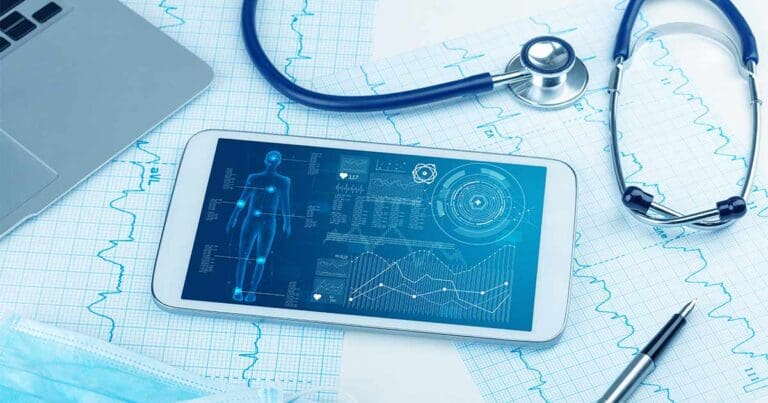Benefits of Digital Transformation in Healthcare with Examples

With the goal of improving patient outcomes and minimizing costs, healthcare organizations around the world are turning to digital transformation as a key strategy for modernizing their operations.
From utilizing artificial intelligence (AI) to drive more personalized care all the way to leveraging blockchain technology to enhance secure data sharing, digital transformation is unlocking tangible benefits for healthcare providers, patients, and everyone in between.
What is digital transformation in healthcare?
Digital transformation in healthcare is the process of leveraging emerging digital technologies to improve the quality, safety, and efficiency of patient care. It involves the use of digital tools such as analytics, artificial intelligence (AI), mobile technologies, and more to enable and accelerate innovation across diverse healthcare settings.
Examples of digital transformation in healthcare
Digital transformation examples in healthcare include the use of AI, cloud computing, data analytics, and use of mobile applications.
- Artificial intelligence
- Cloud computing
- Data analytics
- Mobile applications
- Blockchain technology
- Patient management systems
Artificial intelligence in healthcare
AI enables providers to analyze large amounts of data quickly, leading to more accurate diagnoses and better-informed treatment plans as evidenced by AI detecting cancer in some patients even before doctors.
AI can also be used to automate routine tasks such as appointment scheduling, freeing up staff time for more complex work.
Cloud computing in healthcare
Cloud computing provides a secure way to store and access copious amounts of patient data, eliminating the need for costly on-site storage systems.
The cloud can also facilitate data sharing between providers, enabling a more comprehensive view of the patient’s medical history and leading to improved coordination of care.
Data analytics in healthcare
Data analytics helps healthcare organizations uncover new insights from their data, enabling them to make better decisions that lead to improved patient outcomes.
Analytics can also be used to improve operational efficiency by identifying areas of waste and excess spending.
Mobile applications in healthcare
By leveraging the ubiquity of mobile devices, clinicians can now access patient data from anywhere, anytime.
This increases the speed at which providers can respond to health issues, giving patients greater peace of mind and potentially saving lives.
Blockchain technology in healthcare
By leveraging blockchain’s secure data-sharing infrastructure, healthcare providers can ensure patient data remains private even as it is exchanged between multiple parties.
This could help prevent medical identity theft and other forms of fraud while also ensuring patient information remains accurate and up to date.
Patient management technology in healthcare
Patient management systems provide a unified platform for coordinating patient care, eliminating the need to manually manage and verify multiple documents.
These systems also enable clinicians to track patient progress in real-time, allowing them to quickly intervene when issues arise.
The benefits of digital transformation in healthcare
Digital transformation can improve speed, safety, and accuracy throughout the healthcare organization, leading to a number of benefits for both providers and patients.
Digital transformation drives improved patient outcomes in healthcare
Through greater access to data and insights, providers can make more informed decisions and develop better treatment plans, leading to improved patient outcomes.
Digital transformation increases operational efficiency in healthcare
By streamlining processes, healthcare organizations save time and money while increasing their ability to respond quickly to changes.
Digital transformation enhances secure data sharing among healthcare providers
By leveraging blockchain and other secure data-sharing technologies, healthcare organizations can ensure patient information is always accurate and up to date while preventing medical identity theft.
Digital transformation lowers costs in healthcare
Due to improved analytics capabilities, healthcare organizations can identify areas of waste and excess spending, leading to lower costs.
Digital transformation drives greater patient engagement in healthcare
Through digital technologies, healthcare organizations can more easily engage with patients and provide better access to care.
Digital transformation in the healthcare industry
By leveraging the power of emerging digital technologies, healthcare organizations can create a new level of efficiency and quality in their operations.
In doing so, they will be able to optimize their services for better outcomes and satisfaction from both patients and providers.
With the right vision and implementation plan, digital transformation can become a key driver of success in healthcare.
The future of healthcare is digital — it’s time to embrace the possibilities.
Looking To Gain Clarity On Your Digital Transformation Needs?
Download Your Tactical Guide to Digital Transformation now and learn everything you need to know in 10 minutes or less!
More articles about job searching and industry trends:
- HR Technology in Hiring: Streamlining Your Recruitment & Onboarding
- 4 Simple Resume Tips to Help You Hire Job Candidates Faster
- What Does a Recruiter Do & Who Do They Work For?
- Will ChatGPT Replace Your Job?
- How to Spot & Avoid Fake Job Posting Scams
- What to Do If You Find Out Your Coworker Makes More Money Than You
- Hidden Job Market: What Is It & How to Find Jobs On It
- How to Best Explain Having a ‘Gap’ on Your Resume
- Cliche Interview Answers to Avoid & What to Say Instead



